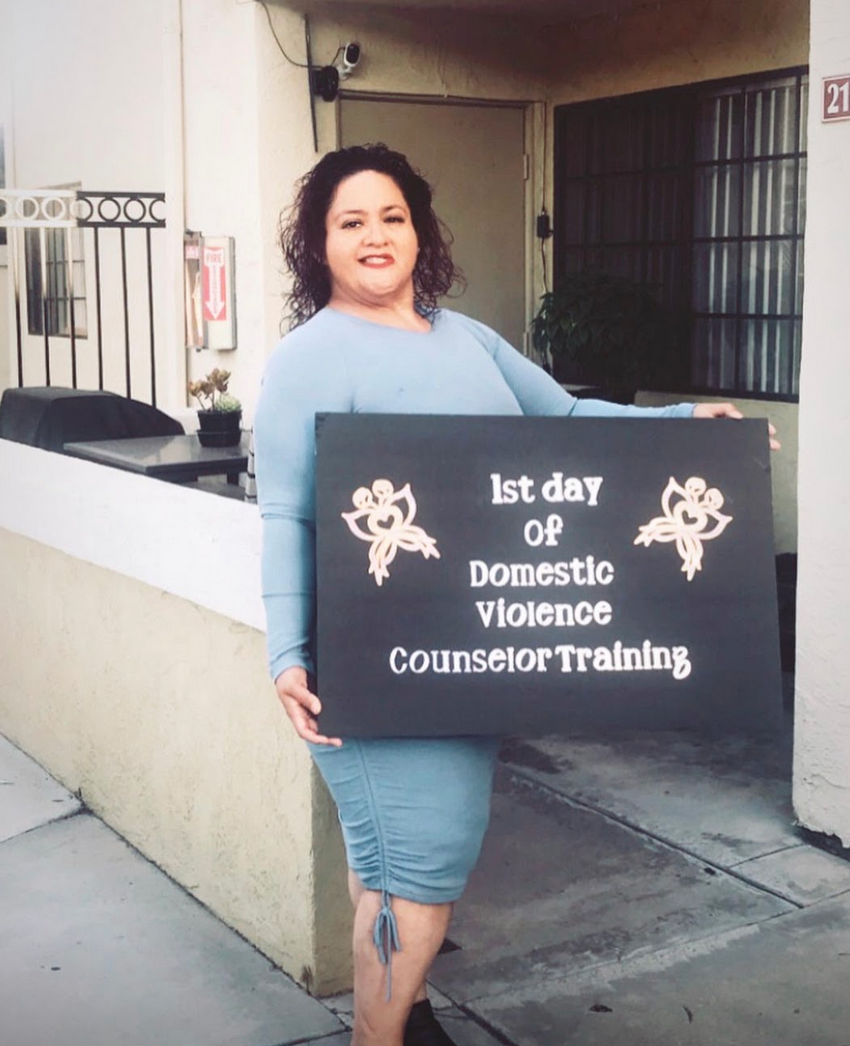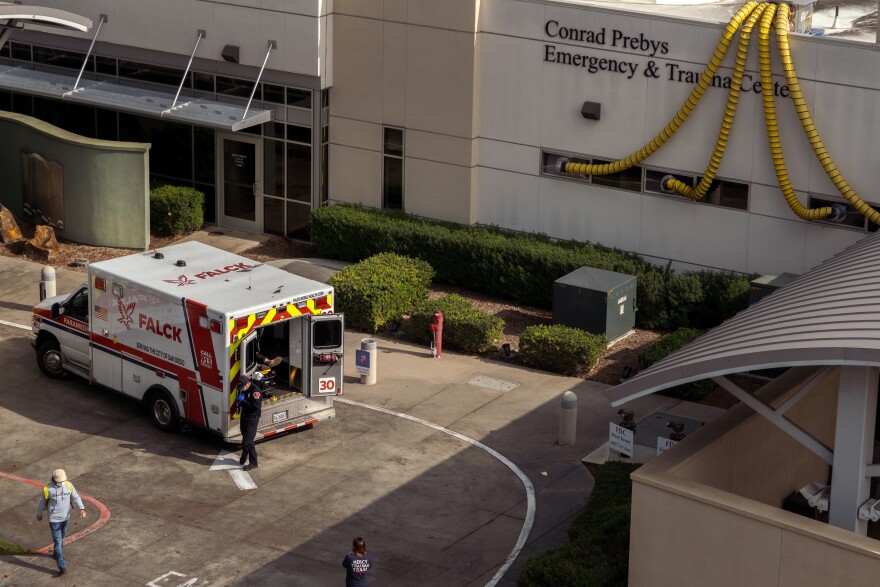On Jan. 27, 2018, Isabel Rosales was running from her home in San Diego’s Old Town neighborhood. And she was running for her life.
David Espinoza, her husband at the time, had stabbed her and slashed her throat.
"I just started screaming for help,” Rosales said. “I started screaming that my kids are in my house. I started screaming his name."
Rosales ended up in the UC San Diego Health emergency room. In the ER, a member of the hospital staff suspected she was a victim of domestic violence called police. Such a call is required under current California law when a person with visible injuries shows up at a hospital or doctor’s office and domestic violence is suspected.
But that law would change if a bill making its way through the state Legislature is passed and signed by Gov. Gavin Newsom. State Assembly Bill 1028 would eliminate the requirement that medical staff notify the police, leaving the decision to the victim. It's created a deep divide between activists and law enforcement.
The bill’s author, Rep. Tina McKinnor, D-Inglewood, is among many who say the current law creates fear in domestic violence victims.
McKinnor said under her bill, a healthcare professional "will refer them to a domestic violence center survivors center — someone that can help them plan, get the services they need, when they intend to leave their domestic violence situation."
The change “would increase access to healthcare and ensure that survivors are provided the agency and information they need to be safe and healthy," according to a fact sheet provided to legislators.
AB 1028 has cleared the state Assembly and it passed the Senate's Public Safety Committee on Tuesday.
An underreported crime
In 2021, a total of 18,185 domestic violence incidents were reported to law enforcement in the San Diego region, according to the San Diego Association of Governments. On average, there are 13 domestic violence-related homicides annually in San Diego.
Casey Gwinn, a former San Diego city attorney and one of the founders of the local Family Justice Center for domestic violence victims, said passing AB 1028 would be a mistake.
"(It will) cause serious injury or death to victims of domestic violence," Gwinn said. "Anybody who thinks this bill is pro-survivor, or pro-domestic violence intervention is deluding themselves.”
The Family Justice Center, which first opened in San Diego in 2002, provides a myriad of services under one roof for victims.
Gwinn is joined in opposition by current San Diego City Attorney Mara Elliott and San Diego County District Attorney Summer Stephan. The California Board of Registered Nurses originally supported the bill but on June 29 voted unanimously to oppose it, expressing concerns the legislation ignores the "unintended consequences” of removing the reporting requirements.
"These laws recognize the ugly truth about the dynamic of intimate partner violence,” Elliot said.
McKinnor said the ugly truth is the fear of unknown consequences victims face when the police are notified of suspected abuse. They feel powerless to control what happens next in their lives, she said.
Until recent decades, domestic violence was a hidden crime in the United States — victims usually didn’t come forward, and when they did, police often looked the other way. It is difficult to document precisely how often the crime occurs and how serious individual instances are because it usually happens in private.
A watershed event in domestic violence awareness came in 1994 when O.J. Simpson was accused of murdering his ex-wife, Nicole Simpson Brown. Brown had repeatedly sought police protection, but was largely ignored. The current state law was passed that year.
A survivor’s story
Isabel Rosales’s experience is an all-too familiar story of domestic violence victims. Her 15-year marriage to Espinoza began violently and never changed. But she said she would ignore his angry episodes because they were parents of three young children and she knew the pain of growing up in a broken home.
In fact, her own mother had been murdered by her partner.
"I just wanted to beat the odds," Rosales said. “I wanted to be that family that stayed together no matter what. And I wanted my kids to grow up and have both of their parents together."
But she had reached the end of her rope on that day in 2018. She told Espinoza she wanted out of the marriage. He exploded and came at her with a knife, she said.

"He jabbed me in my neck,” she said. “I remember seeing my girls jump up from their bed and my son was laying down right in front of me and the blood splashed on his bed."
When the police arrived she was taken by paramedics to UCSD. The doctors asked her what happened and she explained the man that attacked her was in the next curtained cubicle, handcuffed. He had tried to kill himself.
"All I wanted to know was that my kids were unharmed, that they were okay," Rosales said. "They made it out of the house and he was gonna go away."
Espinoza did go away, pleading guilty sentenced to 23 years in prison for attempted murder and spousal rape plus enhanced charges for great bodily injury. He is serving his time at the California Men's Colony in San Luis Obispo.
Meanwhile, Rosales rebuilt her life. She and her children went through therapy and are doing well, she says. Last fall, she became a domestic violence counselor, helping others "understand that they are deserving of a peaceful life, they are deserving of a beautiful life and, and to be hopeful for the future. Because your story doesn't end with what you went through."
A question of safety
Despite stories like Rosales’, McKinnor said she doesn't believe mandating contacting law enforcement is the best way to deal with domestic violence.
"I believe that having the women have a safe place to go and plan their exit is the best way forward," she said.
McKinnor has interviewed a number of domestic violence victims and believes this makes them feel safe by letting the victims decide whether to engage with the criminal legal system.
As it happens now, "when the police show up at your home and pick up the man or the woman," the victims are in danger, McKinnor said. The aggressor "may not even stay in jail, or they may not even pick them up, they may come to the house and leave. And then you have more trouble because you're left there.”
McKinnor said under her bill the victim can still call the police or have hospital staff do it for them.
“If the victim wants to press charges or call the police, they're still able to do that. They can ask the doctor at that time to call the police,” she said.
While many might assume that giving a doctor or nurse power to make that call without the consent of the victim would be safer, the opposite can be true — especially for people of color, Mckinnor said.
“So you walk in, you seem to be beat up. And the doctor just calls the police with no services,” she said. “This is very, very dangerous for women of color, and any type of minority immigrants as well (and) LGBTQ folks.”
Gwinn said with the new law a health care professional would only be requested to provide phone numbers to victims for services. Nothing more. No police, no health care professionals need be involved in the case, points out Gwinn. The "warm handoff" has no documented value and is a mistake, he said.
Gwinn said it’s unrealistic to expect a victim to report abuse when they are in fear for their life. "There will be absolutely no reporting when a victim is too terrified to report to the police."
Furthermore, Gwinn and others said police understand the realities facing victims and are careful not to increase their risk of being hurt. Police virtually never come to the house after a medical report of suspicious injury, he said. The reality is in San Diego, the victims go to Family Justice Centers and then detectives or advocates follow up with the victim.
The reality of what is going on in today's emergency rooms is not being considered by the bill's supporters said Hillary Larkin, a physicians assistant and legislative director for the California Sexual Assault Forensic Examiners Association or CALSAFE.
Larkin is part of 48 teams across the state that see patients in health care settings and document their injuries. Often, she said, a report has already been taken with or without the victims' consent because it's in an emergency situation.
"More than 50% of the patients that we're seeing are coming by ambulance or are accompanied by police," Larkin said. "So a report has already been made."
Larkin said domestic violence victims should receive the same attention and services afforded by sexual assault victims, which is currently not done now. That's the legislation that should be pursued, she argues.
McKinnor’s bill does require mandated reporting where the injury is by means of a firearm.
That is particularly troublesome to Larkin and other opponents. It shouldn't be "just gunshot wounds," she said. What about "stab wounds, strangulation, being run over by a car, beaten with a hammer, all these things I've seen in my practice, within the last six months?"








